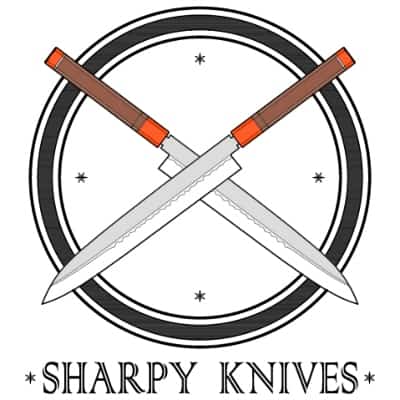As an Amazon Associate, we earn from qualifying purchases with no additional costs for you.
Diamond sharpening stones can be an expensive investment for your knife sharpening, which may tempt some people to look for lower-priced products. How do you know which stones are worth the money, and how low in price should you go before quality is compromised? Our diamond stone buyers guide will help you choose the right stones at the right price.
Diamond sharpening stones can be expensive, but higher-end stones offer better value for money than cheap stones. Quality diamond stones such as Atoma will outlast and outperform most other diamond stones available. The durability, longevity, and effectiveness make these stones worthwhile!
If you are in a quandary about which diamond stones to buy, or even if you should consider diamond stones at all, then our buyers’ guide may help you make the decision either way!
If you are interested in checking out the best diamond sharpening stones (Atoma) you can find them by clicking here (Amazon link).
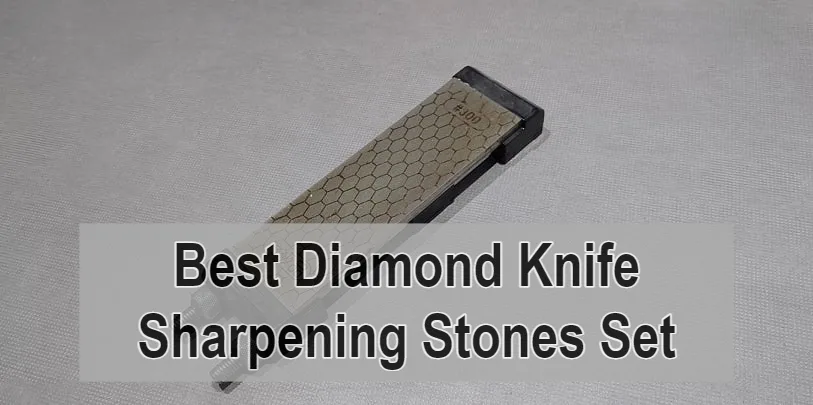
Are Diamond Sharpening Stones Worth It?
When you consider the price of diamond stones, you may wonder if they are worth it and whether you should rather opt for traditional water stones.
We can set your mind at ease that diamond stones are definitely worth it. However, you need to ensure that you get what you pay for and choose the right stones for a good sharpening experience.
As with most purchases, you get what you pay for, so if you don’t have the budget for a decent set of diamond stones, it would be better to save towards a good set than settle for a lower-cost option.
The main reasons that diamond stones are worth the price are as follows.
- Diamond stones cut efficiently
The effectiveness of the diamond abrasive makes short work of most sharpening jobs. This makes extensive repairing of a knife-edge or a straightforward sharpening take less time to complete.
- Diamond stones are durable
The durability of the diamond abrasive on the stones makes quality diamond stones much more durable and longer-lasting than most other traditional whetstones.
- Diamond stones do not dish
Traditional whetstones wear unevenly and begin to take on a hollow or dish shape with use. When this happens, they need to be flattened. This does not happen with diamond stones. Hence, they do not require flattening.
- Diamond stones are easy to clean
Diamond stones are not porous, which means they do not absorb lubricants used during sharpening. This makes cleaning the stones after use as simple as washing with warm soapy water and drying off.
- Diamond stones are easy to store
Diamond stones are not adversely affected by temperature changes as normal whetstones are. Traditional whetstones can crack or break when subjected to sudden temperature changes or wide temperature ranges.
These advantages of diamond sharpening stones are the features that have resulted in them gaining popularity among knife owners and even home knife owners who want to do their own sharpening.
TIP: If you are not sure what diamond sharpening stones are good for and want to know more about their storage and cleaning, check out the ultimate guide in the article below:
Diamond Sharpening Stone: Explanation, Cleaning & Storage
Who Makes the Best Diamond Sharpening Stones?
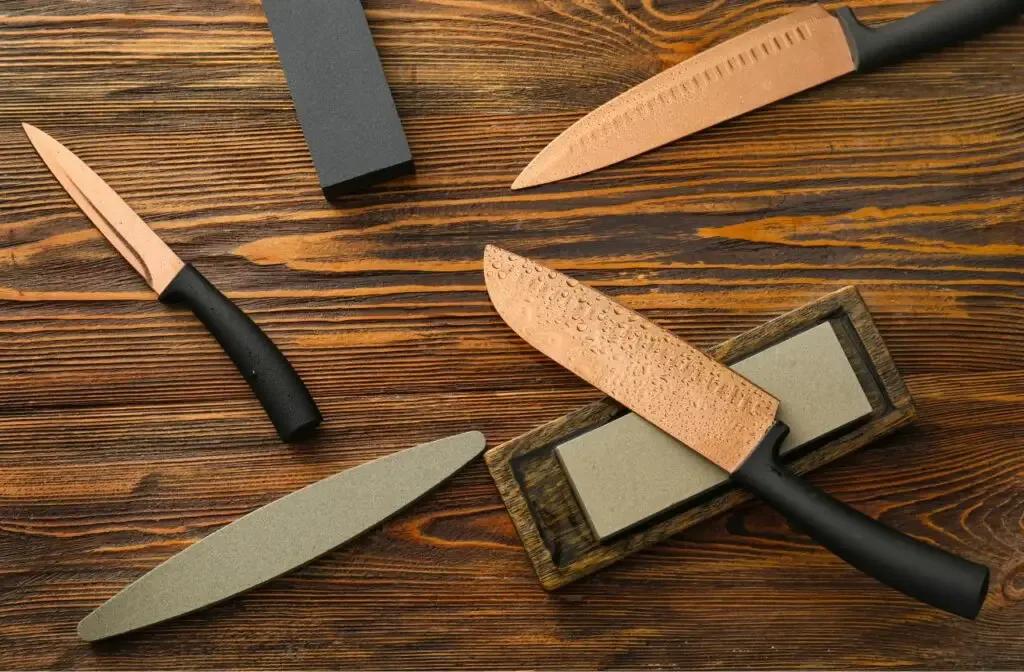
There are several high-end diamond stone manufacturers, but the cost of these stones is mostly prohibitive for hobbyist knife sharpening operations.
Recently, the cost of diamond stones has reduced, which is largely attributed to their increased popularity. This is good news for knife owners since high-quality stones are now more affordable.
The reduction in the price of better quality diamond stones has narrowed the price gap between good stones, average stones, and cheap stones. This has muddied the waters and raised doubts in new buyers of diamond sharpening stones.
Fortunately, our knowledge and expertise can guide you in selecting the right diamond stones for your sharpening needs.
We will offer what we consider to be a high-quality diamond stone set, a mid-range stone set, and a cheaper diamond stone set. We will compare the three variations and give our recommendation.
Best High-Quality Diamond Stones For Knife Sharpening
Our selection for a top-quality, high-end diamond stone is a product range called Atoma diamond stones manufactured by the Japanese company Tsuboman.
Tsuboman products, particularly the Atoma diamond stones, are renowned for their superior quality and attention to detail in manufacture.
The precision to which the stone surfaces are made produces a high level of uniformity across the entire surface of the stone.
Another great feature about these stones is that the diamond surface plate can be replaced without having to re-purchase the base plate.
The advantage of this set is that you get four high-quality stones that will cover a wide range of sharpening needs. These stones are the most durable of the selection and can easily last up to 10 years.
- The number of stones in the set: 1 x 140 grit, 1 x 400 grit, 1 x 600 grit, and 1 x 1200 grit (Amazon links).
- Stone dimensions: Each stone is 8 inches long by 3 inches wide and 0.47 inches thick.
- Stone weight: Each stone weighs 1.64 pounds.
- Backing plate material: Machined aluminum.
- Diamond type: Monocrystalline.
- Is a stone holder included? Yes, a stone holder is included, providing a secure anchor when sharpening.
- Diamond density and even spread: Excellent
- Durability: High durability
- Country of manufacture: Japan
The price of these diamond stones may seem a little high, but compared to the quality of the product over other diamond stones and the durability of the stones, the price is worth it.
We highly recommend these stones, and if they are within your budget, you should not hesitate in your purchase of these stones; they will be well worth the investment.
PRO TIP: We personally use diamond plates by Atoma. They are quite expensive but of the top quality with very long service life.
The initial costs are higher but you have an option of buying replacing diamond skin for all Atoma plates. The costs of replacing diamond skin are much lower than the cost of buying a new diamond plate.
So if you are going to use diamond plates regularly and want to get the best quality on the market, check out the four Atoma diamond plates listed below (Amazon links).
- Atoma Diamond Sharpener Coarse Grade 140 Grit
- Atoma Diamond Sharpener Medium 400 Grit
- Atoma Diamond Sharpener Fine 600 Grit
- Atoma Diamond Sharpener Super Fine 1200 Grit
These 4 diamond sharpening stones are all you need to have for repairing or sharpening your knives.
Mid-Range Diamond Stone For Knife Sharpening
For a medium-range, slightly better-than-average diamond stone set, the UltraSharp Diamond Sharpening Stone Set comprising of a 300-grit, 600-grit, and 1200-grit diamond plate is a good choice (Amazon links).
These stones are made from monocrystalline diamonds bonded to the metal plates using the electroplating method. This makes for great durability and limits the loss of diamonds on the surface from adhesion problems.
The UltraSharp Diamond Sharpening Stone Set is a mid-range stone, and while durable, it will not last as long as the high-quality Atoma stones.
The diamond plates on these stones are not replaceable, and you can expect about five years of use out of these stones compared to the Atoma stones.
- The number of stones in the set: 1 x 300-grit, 1 x 600-grit, and 1 x 1200-grit (Amazon links).
- Stone dimensions: Each stone is 8 inches long by 3 inches wide and 0.25 inches thick.
- Stone weight: Each stone weighs 2.2 pounds.
- Backing plate material: Nickel-plated steel.
- Diamond type: Monocrystalline.
- Is a stone holder included? Yes, a stone holder is included, providing a secure anchor when sharpening.
- Diamond density and even spread: Good
- Durability: Good
- Country of manufacture: USA
While the UlstraSharp stones are good stones and are priced at about half of the Atoma stones, if you can wait and save a little longer for the other half of the purchase price, the Atoma stones would be the better purchase.
The three grits offered in this set also limit the versatility of the type of sharpening processes that can be accomplished compared to the four stones in the Atoma Diamond Stone set.
Budget Diamond Stones Set For Knife Sharpening
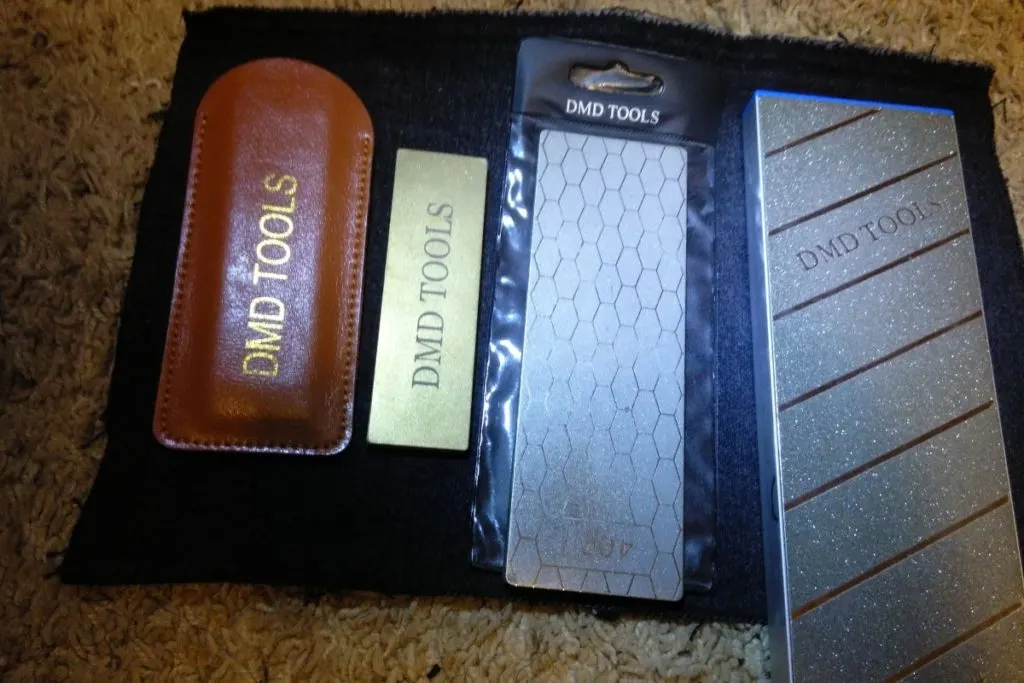
An example of a budget diamond stone is the DMD Diamond Whetstone Knife Sharpener Set (Amazon link), which contains a 150-grit, 325-grit, and 1200-grit diamond plate mounted on a triangular block.
The set comes with a dish to which the stone is mounted and can be filled with water to lubricate the stones during sharpening.
One of the biggest issues with this set is that the grit levels include fixing plates in the low grits and a high grit honing grit, but no sharpening grit plates.
- The number of stones in the set: 1 x 150-grit, 1 x 325-grit, and 1 x 1200-grit (Amazon link).
- Stone dimensions: This is a triangular block with diamond plates on the three sides. The block’s dimensions are 10 inches by 2.8 inches by 0.6 inches.
- Stone weight: 4.89 pounds.
- Backing plate material: Aluminum, steel, and ABS plastic.
- Diamond type: Unknown.
- Is a stone holder included? Yes, a stone holder is included, which can be filled with water to lubricate the stone.
- Diamond density and even spread: Average
- Durability: Very low
- Country of manufacture: China
This diamond stone set is very cheap, but we would not recommend this set at all. The diamond plates are very thin, so the electroplating holding the diamonds in place is also thin. This results in the diamonds being easily dislodged from the diamond plates.
The thinness of the plates also allows them to warp, which means the plates are not flat, which can adversely affect the final edge of your knife.
The cost may be low on this diamond stone option, but the abrasives will not last long at all, which would require the product to be replaced within six months to a year.
TIP: A lot of people prefer electric knife sharpeners over classic manual sharpeners. But one of the most often asked questions about electric sharpeners is: do they ruin your knives? Find out the complete answer in the article below:
Explained: Do (Electric) Knife Sharpeners Ruin Knives?
Are Cheap Diamond Sharpening Stones Good?
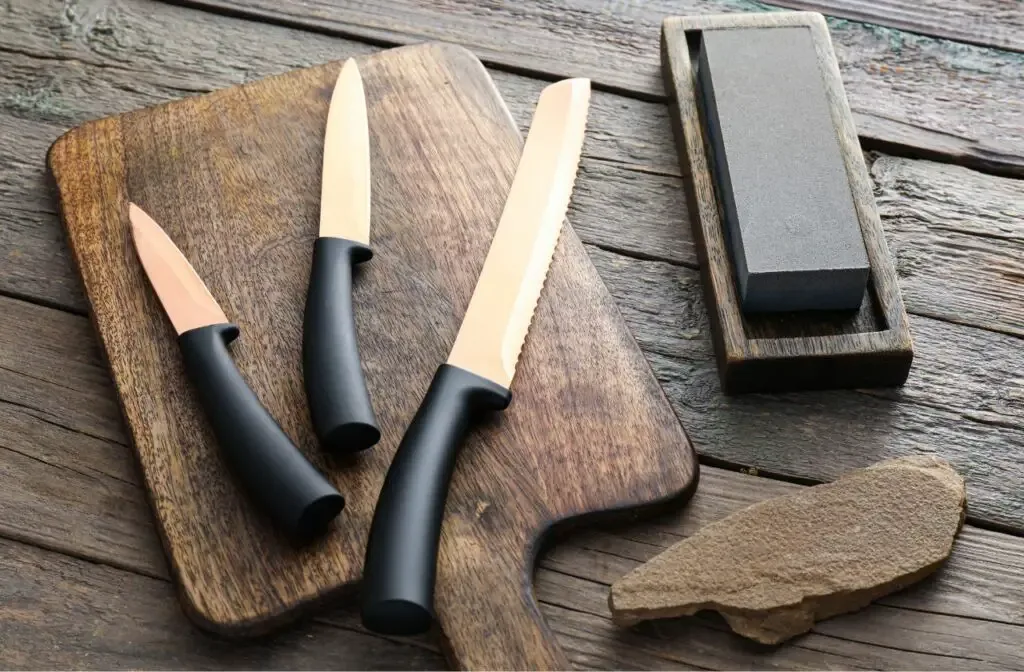
We all like finding a good deal, but there is a difference between a good deal and a cheap product, which holds true for diamond stones as well.
Most people who have not had a good experience with diamond stones probably bought cheap products. These low-end products do not perform as well as high-quality products.
You may find the following is true of cheaper diamond stone products.
- Low cutting efficiency
Cheap diamond stones may use inferior diamonds, which can crack and break, limiting the cutting effectiveness of the diamond abrasive.
- Low diamond density
Many manufactures of cheap diamond stones cut corners to cut costs, such as reducing the density of the diamonds embedded in the surface. This reduces the efficiency of the stone.
- Uneven diamond distribution
Uneven distribution of the diamond abrasive across the stone’s surface will result in some areas of the stone cutting better than others. This results in the uneven sharpening of the knife’s edge.
- The stone is not flat
Many cheaper diamond stones have thin plates to which the diamond abrasive is bonded. This causes the plate to flex when used or be susceptible to temperature changes, causing bowing or dishing. This makes for uneven sharpening, and the level of sharpness of your knives will be less than desirable.
- The diamonds become dislodged
Cheaper diamond stones have a thinner layer of nickel in which the diamonds are embedded. This means the diamonds are not as securely rooted in the nickel plating and can be more easily dislodged by even moderate pressure on the abrasive surface.
- Corrosion of the diamond plate
Cheaper diamond stones frequently rust and show discoloration of the stone with even moderate use.
These are the main reasons we do not recommend that you opt for a cheap diamond stone for your knife sharpening. More expensive diamond stones are vastly superior to the cheap versions and will offer you a vastly different sharpening experience!
TIP: If you are interested in better understanding why expensive whetstones are much better than cheap ones, check out the complete comparison in the article below:
5 Reasons Why Expensive Whetstone Is Better Than Cheap One
What Lubricant to Use with Diamond Sharpening Stones?
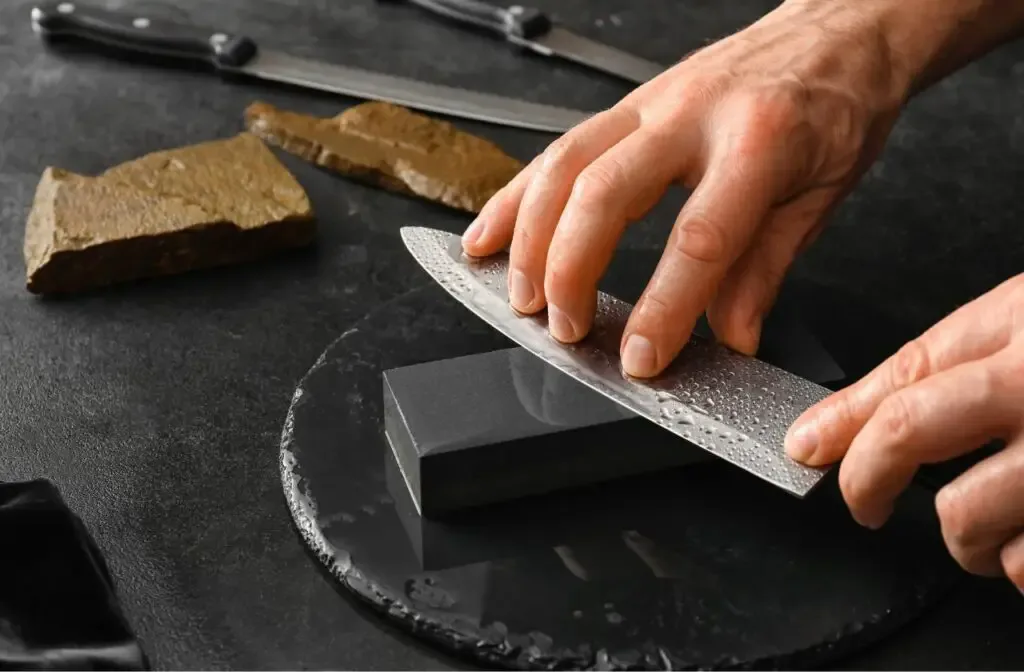
Most diamond stone manufacturers recommend using water as their diamond stones’ lubricant. Many people disagree because they feel the water causes the stones to rust. However, rusting should not be a problem if the stones are washed and dried thoroughly after each use.
Discoloration of diamond stones is a natural occurrence when the stone is used, and it is often mistaken for corrosion caused by the water used as the lubricant.
People use many other options for lubrication on their diamond stones other than water. Other options can include Windex or oil.
If oil is to be used, it is recommended that vegetable oils are not used since these oils solidify on the stone and go rancid. The best oil to use is mineral oil, which has a low viscosity and is easily washed off.
Best Lubricant for Diamond Sharpening Stones
The best lubricant to use on your diamond stones will be based largely on personal preference. If you are new to diamond stones and don’t have a preference yet, we have some suggestions for you to try out.
Our first suggestion would be to try plain water since this is the lubricant most manufacturers recommend for diamond sharpening stones.
If you would like to try an alternative, we have found that Krud Kutter Cleaner and Degreaser (Amazon link) do better than any of the other alternative lubricants.
The advantage of this product is that it also removes rust, which is an added advantage if you are struggling with rust on your diamond stones.
Diamond Sharpening Stones Vs. Other Sharpening Methods
Sharpening stones, an essential tool for maintaining the efficacy of knives, come in various materials and forms, each boasting its unique advantages and shortcomings.
Let’s compare diamond sharpening stones and other prevalent sharpening methods and materials, to help you make an informed decision when selecting the optimal sharpening tool for your knives.
Diamond Sharpening Stones
Pros:
- Efficiency: Diamond stones are renowned for their ability to sharpen blades swiftly and effectively due to the hardness of the diamonds.
- Durability: They boast a long lifespan, especially high-quality ones, which can last up to a decade with proper care.
- Maintenance-Free: Unlike other stones, diamond stones do not dish or lose their flat surface over time, eliminating the need for flattening.
- Versatility: Capable of sharpening even the hardest steel, making them a universal sharpening tool.
Cons:
- Cost: High-quality diamond stones can be quite an investment compared to other sharpening materials.
- Aggressiveness: They can remove a significant amount of material from the blade, which might not always be desirable.
Whetstones
Pros:
- Precision: Whetstones, especially those with finer grits, allow for precise control over the sharpening process.
- Variety: Available in various grits and materials, offering a wide range for specific sharpening needs.
- Affordability: Generally, whetstones are more budget-friendly than high-quality diamond stones.
Cons:
- Maintenance: They require regular flattening to maintain an even, effective sharpening surface.
- Soaking: Some whetstones require soaking before use, adding an additional step to the sharpening process.
Ceramic Rods
Pros:
- Convenience: Ceramic rods offer a quick and easy way to hone knives, especially between thorough sharpening sessions.
- Gentleness: They are less abrasive, preserving the longevity of the blade.
Cons:
- Limited Capability: They are not ideal for repairing significantly dull or damaged blades.
- Fragility: Ceramic rods can be brittle and are prone to cracking or breaking if dropped.
Stropping
Pros:
- Finishing Touch: Stropping is excellent for refining and polishing the edge after sharpening, providing a razor-sharp finish.
- Blade Preservation: It removes minimal material, preserving the blade’s lifespan.
Cons:
- Not for Sharpening: Stropping alone cannot revive a dull blade and is meant for maintaining an already sharp edge.
- Requires Technique: Effective stropping demands a certain skill level to achieve the desired results.
Electric Sharpeners
Pros:
- Ease of Use: Electric sharpeners offer a straightforward and effortless sharpening process, suitable for beginners.
- Speed: They can quickly sharpen a blade, making them convenient for swift touch-ups.
Cons:
- Less Control: They offer less control over the sharpening process, which might not be suitable for high-end knives.
- Aggressiveness: Some electric sharpeners can be quite harsh on the blade, removing more material than necessary.
Choosing the right sharpening method hinges on your specific needs, preferences, and the knives you own. Diamond sharpening stones stand out for their durability and efficiency but come at a premium. Whetstones and ceramic rods offer more gentle sharpening, while electric sharpeners provide a quick and easy solution.
Stropping, on the other hand, is unparalleled for achieving that razor-sharp edge. Understanding the pros and cons of each method will enable you to select a sharpening tool that aligns seamlessly with your knife-care routine, ensuring your blades remain in peak condition for years to come.
Conclusion
A diamond sharpening stone can be a great investment and produce exceptional results in your knife sharpening, or it can put you off diamond stones for life! The deciding factor will be the quality of the diamond stones you choose to purchase.
In some cases, buying a mid-range product will suffice and give you adequate performance and results, but we have found that it is better to select a higher-end product with diamond stones.
The initial cost of a better product may be a little higher, but the results and durability of the stones will be the most cost-effective in the long term.
TIP: Do you know how to properly sharpen a knife with diamond sharpening stone? Good technique is really important for not damaging your knives or the stone itself. Check out the complete sharpening guide in the article below:
